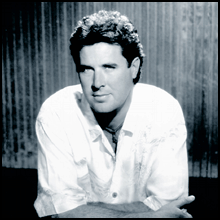![[Sidebar]](/standard/image/sidebar.gif)
![[Music Reviews]](/standard/image/headers/music_reviews_header.gif)
| clubs by night | club directory | bands in town | concerts | hot links | reviews & features |
The truth about Nashville
Allison Moorer and Vince Gill stand out
by Ted Drozdowski
Allison Moorer
If you're a fan of today's big country hit makers -- artists like Brooks & Dunn, Shania Twain, Trisha Yearwood, LeAnn Rimes, Wynonna, the Mavericks -- I've got a bitter little maki roll for you. Your father's country music was better. Deny it, fight it . . . cling to your copy of Alan Jackson's greatest and Reba McEntire's latest. Thump this month's issue of Music City News as if it were Mao's little red book. But that's the truth.And the truth is what country music is supposed to be about. Which is why it's failing us now. The truth does not come off the assembly line. The truth does not hide under the varnish of strings and synthesizers. The truth does not sing about its wealth of sexual experience at age 14. The truth does not do the "Boot Scootin' Boogie." The truth is found naked in the fields of life. It dwells in plain emotions simply expressed. In plain stories of real people doing real things in real lives. And when it's dressed for a Saturday night in town (think Patsy Cline's "Crazy"), the truth still wears its heart on its sleeve.
The truth is not "The Greatest Love of All." It is the comfort and pain of a couple aging through the years. It is the numbness of loss laid before us like a cheeseburger and a 50-cent cup of coffee. It is in the songs of Hank Williams, Patsy Cline, Loretta Lynn, Tammy Wynette, Merle Haggard, Johnny Cash, Ray Price, and a host of other artists from the '50s and '60s. These are the people who made your father's (and, with any luck, your mother's) country music. They are the music's unforgettable second generation. And when the last of them pass -- like the second generation of jazz, which included Duke Ellington, Ella Fitzgerald, Dizzy Gillespie, Coleman Hawkins, Billie Holiday, and their artistic peers -- we are not likely to hear their kind again.
Occasionally, however, a little bit of their magic blows into contemporary country, like drifting smoke from the Caterpillar's hookah. And its effect is every bit as intoxicating. Once again, think of jazz and its current generation of so-called Young Lions. When the best of them -- artists like Wynton Marsalis 10 years ago, Nicholas Peyton today -- make their strongest statements, it's in a language on loan from the past. But one that still has something to say to us in the '90s. That's because the truth about living does not fundamentally change, even if instruments, studios, people, and the times do.
RIGHT NOW, few country artists seem to have a better grasp of this than Allison Moorer and Vince Gill. Moorer is a newcomer whose ballad "A Soft Place To Fall," from The Horse Whisperer soundtrack, recently became a runaway hit. A video directed by Robert Redford didn't hurt. But "A Soft Place To Fall" is the kind of gently passionate work that one hopes would find its own place in listeners' hearts (if not radio programmers') without Hollywood clout. Especially since it's no fluke. Much of the rest of the material on Moorer's debut album, Alabama Song (MCA), which reaches stores on September 22, is as good. And she co-wrote 10 of its 11 songs, which seems to dispel concerns that she might be just another Nashville puppet, despite MCA/ Nashville president Tony Brown's executive-producer credit on the CD. (I'd guess Brown wants it known that he's directly associated with an artist of Moorer's quality.)
As for the very established country superstar Gill, his music in the past has rarely been as good as his new The Key (MCA). By good, I mean meaningful, profound, full of the truth. He has, however, moved shitloads of units, starting with the 1980 smash "Let Me Love You Tonight," which he sang as lead vocalist of Pure Prairie League. From the mid '80s on, his career path has been paved with hollow platinum -- cloying and campy hits including "Cinderella," his duet with Reba McEntire "The Heart Won't Lie," "What the Cowgirls Do," "Pretty Little Adriana."
Not only does Gill have seven platinum albums, but he has 11 Grammys and 17 awards (including five Vocalist of the Year titles) from the Country Music Association. That these awards recognize industry and have little if any relationship to quality is something savvy listeners already know. Too often Gill's work has been puffery: sappy ballads and shallow up-tempo numbers that keep somebody like me, who was raised on his parents' "For the Good Times" and "Hungry Eyes," punching the radio buttons whenever it comes up.
Vince Gill
Yet it would be lying to say that Gill has ever given a less than outstanding performance of any of his material. He is a truly angelic singer, technically far more proficient than Moorer and gifted with a soaring high end and a sophisticated ear that allow him to engineer harmonies -- even live -- that recall the Eagles in their prime. He's also a blazing guitarist, as he proved time and again a few weeks ago at Warwick Musical Theater and at Harborlights in Boston. He is a master of the clean-toned, fast-paced fretwork that's synonymous with Nashville -- though it's actually rooted in the music that Buck Owens and Merle Haggard were making in Bakersfield, California, in the '60s.Switching between a Telecaster and a couple of Stratocasters in concert, Gill defined the party line on multiple-string bends, quick stutter picking, and daredevil licks with a smiling ease that contributed mightily to his appealing on-stage persona. Wearing bluejeans and a loose Hawaiian-print shirt, he came off as a humble, good-natured big guy who absolutely loves what he does. He also showed genuine respect for his eight-piece band, especially sixtysomething pedal-steel player John Hughey, whose atmospheric solos made him beam like a kid who'd just won a little-league game.
During the Harblorlights concert, Gill mentioned he and his band had just come off a long stint of playing state fairs. "The corn dog circuit," he called it. And he thanked the audience for actually buying tickets and coming specifically to see him, rather than catching his act as a breather between roller-coaster rides. But tunes like his frilly 1996 hit "Pretty Little Adriana" and "Let Me Love You Tonight" are pure corn dog -- or cotton candy, because corn dogs at least have protein.
The meat of Gill's show came most often from his new The Key. There was the weeping steel-guitar, tear-in-yer-beer traditionalism of "Kindly Keep It Country." "If You Ever Have Forever on Your Mind" recalled the love and sadness Ray Price injected into his greatest vocal turns. "I'll Take Texas" echoed the flat-footed swing of both Bob Wills and Ernest Tubb. And there's more than a touch of the Carter Family's Appalachian balladry in his lyrics to "The Hills of Caroline."
Although he's reaching back for touchstones, Gill's in-concert arrangements were full and contemporary. He used two full-kit drummers and, occasionally, three guitars to keep the rhythm subtly driving. He thickened the beat -- and kept the music's midrange warm and big -- by sometimes using three guitars to play the same rhythm chords. And that left the high end to his and Hughey's delicious solos, with piano either reinforcing the beat or weaving little melodies through the mix. In that manner, he achieved the same richness heard on The Key (actually produced by Tony Brown) while sticking to meat-and- potatoes instrumentation.
As you might guess, Gill's sudden aversion to schlock was triggered by one of life's unavoidable truths: death. "This record is so unlike anything I've ever done," he recently explained on Country Music Television. "I miss doing the hardcore traditional country stuff. That's what moves me. I miss the country music I remember. Losing my dad last year made me remember all the greats like Buck Owens, Merle Haggard, Patsy Cline -- all those great country records with great country fills. That's where my heart is right now." And in The Key's closing "The Key to Life," he pays heartfelt tribute to his banjo-playing old man, who set him on his musical path.
AT TIMES, especially when she's pumping up the pathos of vulnerable ballads like "A Soft Place To Fall" and "Pardon Me," Allison Moorer's Alabama Song sounds like a tribute to Tammy Wynette. Her lyrics often have the same passionate expression of a woman driven to the edge or, worse, to resignation by the circumstances of her life. And the arrangements favor the kind of plaintive steel guitars and simple melodic statements (echoing vocal phrases) that were hallmarks of Wynette-era country music.
Although Moorer lacks the vocal range of many of today's country divas, she is a marvelously expressive singer. Her voice has a few battered edges -- an occasional tease of a lisp, a hint of strain in some of her highest notes -- but a great vibrato that underlines the emotional character of any phrase it's applied to. It puts a small twist of hope into the defeated chorus of "Long Black Train"; it mingles with the pedal steel guitar of the title number to express a desire for worldly experience and, of course, love.
The peppy, comic "The One That Got Away (Got Away with My Heart)" and the spunky "Set You Free" seem slight amid the tinderbox of emotions that Moorer has constructed with the rest of her songs. Yet they resonate like classic country. The first's a ricochet of Buck Owens's "I've Got a Tiger by the Tail"; the latter made me wonder whatever happened to Jeannie C. Riley.
But it's with songs like "Is Heaven Good Enough for You" that Moorer is bound to stake her claim as a genuine artist in Nashville's cesspool of hacks. Riding in on a cloud of steel guitar and a near-martial drum beat, her voice begins at its weariest, setting up a scenario in which she's a mournful woman contemplating the funeral of her dead lover. By mid song, she's taken this oft-used theme into fresh and, for conservative country music, dangerous places. "I was raised not to question/Promises the Bible makes/But how could the Almighty/ Make such a terrible mistake," she sings. "If there's really no more teardrops/And the streets are paved with gold/Send me down some reassurance./I don't believe what I've been told."
In a music community where business is done at church socials more often than golf courses or clubs, "Is Heaven Good Enough for You" is going to offend some powerful characters. But Moorer has the talent, and the deep musical roots, to persevere. She shares the same truths with us as such pioneering country women as Wynette, Cline, and maybe even Mother Maybelle Carter. And unlike Steve Earle, who despite all the years of hype about his country-outlaw status is really a rock-and-roller, she'll have their spirits to guide her -- whether or not she believes in them.
| home page | what's new | search | about the phoenix | feedback |
Copyright © 1998 The Phoenix Media/Communications Group. All rights reserved.

